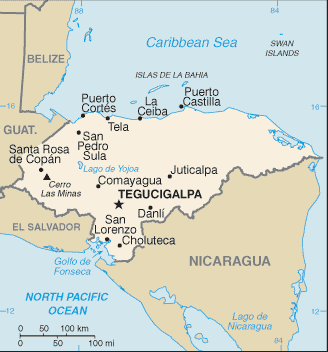
Washington, DC–(ENEWSPF)–August 4, 2016. The Department of State continues to warn U.S. citizens that the level of kidnapping, crime, and violence in Honduras remains critically high. This Travel Warning supersedes the October 2015 Travel Warning.
Criminal activity is a serious problem throughout the country and the Government of Honduras lacks sufficient resources to properly respond to, investigate, and prosecute cases. As a result, criminals operate with a high degree of impunity throughout Honduras.
Honduras has one of the highest murder rates in the world. The U.S. Embassy has recorded 37 murders of U.S. citizens since 2011, with three recorded since January 2016. Official statistics from the Honduran Observatory on National Violence show Honduras’ homicide rate was 60 per 100,000 in 2015. The majority of homicide cases in Honduras have no resolution.
Honduran law enforcement frequently report highway assaults and carjackings by criminals posing as Honduran law enforcement throughout Honduras, including remote areas of Choluteca, Olancho, Colon, and Copan Departments. These criminals set up road blocks or checkpoints and wear some elements of police uniforms and equipment, but are often mismatched and inconsistent. Reports of kidnappings of U.S. citizens are not common; since families of kidnapping victims often pay ransoms without reporting these crimes to police out of fear of retribution, kidnapping figures may be underreported.
Transnational criminal organizations conduct narcotics trafficking and other unlawful activities throughout the country and use violence to control drug trafficking routes and carry out criminal activity. Other criminals, acting both individually and in gangs in Tegucigalpa, San Pedro Sula, and other large cities, are known to commit crimes such as murder, kidnapping, extortion, carjacking, armed robbery, rape, and other aggravated assaults.
Sexual assault is a concern in Honduras. Most Honduran local police and medical staff do not have the capacity to properly investigate, handle evidence collection, and/or provide medical care for sexual assault victims.
Roatan & Bay Islands: Roatan and the Bay Islands experience lower crime rates than the Honduran mainland. While the national government of Honduras, Roatan authorities, and businesses took measures in 2014 to improve tourism security, thefts, break-ins, assaults, rapes, and murders do occur. You should exercise caution, especially at night. If staying at a hotel resort, book tours and sightseeing through the resort or reputable tour companies. Coxen Hole on the island of Roatan should be avoided after dark.
If you are on a shore excursion from a cruise ship, take care to book only with reputable tour companies during your stopover in Honduras. The port agencies at Mahogany Bay and Towne Center have worked to improve taxi service to and from the ports.
Gracias a Dios: Travelers to the department Gracias a Dios should note that it is a remote location where narcotics-trafficking is frequent, infrastructure is weak, government services are limited, and police or military presence is scarce. The U.S. Embassy has restricted U.S. government personnel travel to Gracias a Dios due to credible threat information against U.S. citizens by criminal and drug trafficking organizations. U.S. citizens traveling to Gracias a Dios should consider postponing their travel. Those who choose to travel or currently reside in Gracias a Dios should remain alert to local conditions and for signs of danger, be extra cautious, maintain a high level of vigilance, and take appropriate steps to enhance personal security.
For further information about security in Honduras, see the State Department’s travel website for the Worldwide Caution, Travel Warnings, Travel Alerts, and Honduras Country Specific Information.
Enroll in the Smart Traveler Enrollment Program (STEP) to receive security messages and make it easier to locate you in an emergency.
Contact the U.S. Embassy in Honduras, located at Avenida La Paz, at (504) 2236-9320/2238-5114, 8:00am to 11:30am Monday through Friday. After-hours emergency number for U.S. citizens is +(504) 2238-5114, or +(504) 2236-9320.
Call 1-888-407-4747 toll-free in the United States and Canada or 1-202-501-4444 from other countries from 8:00 a.m. to 8:00 p.m. Eastern Standard Time, Monday through Friday (except U.S. federal holidays).
Follow us on Twitter and Facebook.
The U.S. Embassy is located on Avenida La Paz in Tegucigalpa and can be reached at:
Telephone: (504) 2236-9320/2238-5114
Fax: (504) 2236-9037
After Hours: (504) 2236-8497
Website: http://honduras.usembassy.gov
The Embassy’s American Citizens Services Unit is open to walk-in services Monday through Friday from 8:00 to 11:30 am and can be reached directly at:
Telephone: (504) 2238-5114 ext. 4400
After Hours: (504) 2238-5114/2236-9320 ext.4100
Fax: (504) 2238-4357
Email: [email protected]
Facebook: www.facebook.com/acstegucigalpa
The U.S. Consular Agency in San Pedro Sula is located on the eleventh floor of the Banco Atlantida building (across from Central Park). The agency is open to walk-in services Monday thru Thursday from 12:00 to 4:00 pm and can be reached at telephone: (504) 2558-1580.
Source: http://www.state.gov








